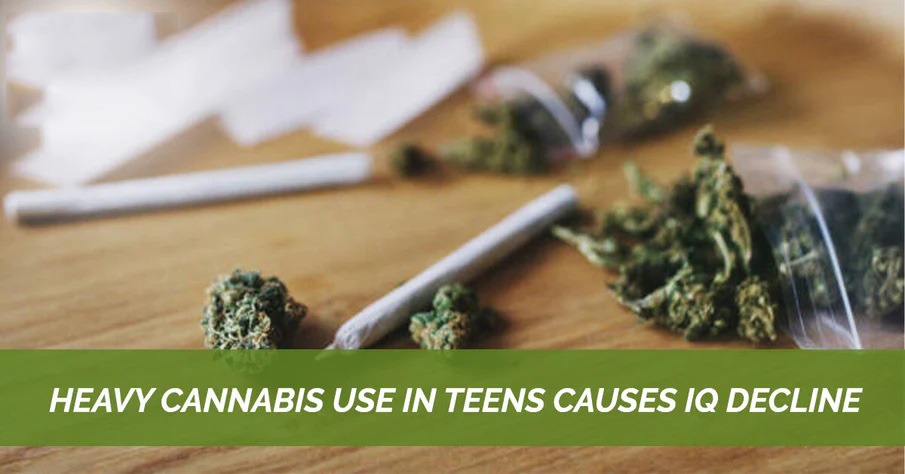State of the Art
Heavy Cannabis Use in Teens causes IQ Decline
Heavy Cannabis Use in Teens causes IQ Decline – The impact of heavy cannabis use on IQ decline in teens is a subject of ongoing scientific research and debate. Several studies have suggested a potential link between heavy cannabis use during adolescence and a decline in IQ, while other studies have found no significant long-term effects.
One of the most well-known studies on this topic is the Dunedin Study, which followed a large group of individuals from birth to adulthood. It found that heavy cannabis use during adolescence was associated with a decline in IQ scores, especially in individuals who began using cannabis at an early age and used it frequently. However, it’s important to note that the decline in IQ was relatively small (an average of 6-8 points) and that the study did not establish a causal relationship between cannabis use and IQ decline.
Other studies have reported conflicting findings. Some have failed to find a significant association between heavy cannabis use and IQ decline, while others have suggested that factors such as socioeconomic status, mental health issues, or use of other substances may confound the relationship between cannabis use and IQ.
It’s worth noting that the developing brain, particularly during adolescence, may be more vulnerable to the potential negative effects of cannabis use. The endocannabinoid system, which is targeted by cannabis, plays a crucial role in brain development and function. Disrupting this system during critical periods of brain development could potentially have long-term consequences.
However, it’s important to approach the topic with caution and consider various factors. The impact of cannabis on cognitive function is complex, and individual differences, genetic predispositions, patterns of use, and other environmental factors can influence the outcomes. Additionally, studies in this area often rely on self-reported data, which can be subject to recall bias and other limitations.
Overall, while some studies have suggested a potential link between heavy cannabis use during adolescence and IQ decline, more research is needed to fully understand the relationship and determine any causal factors. It’s always important for teenagers to be aware of the potential risks associated with cannabis use and make informed decisions based on available evidence.
The Dunedin Longitudinal Study, an ongoing multi-factor survey of 1,037 New Zealanders who were monitored from birth, provided the data that the research team used.
Currently, there is around 40 years’ worth of data from the survey, and over the years, participants have been periodically assessed for IQ and other neurological indices. Read more about the research Scitechdaily
Does Cannabis Have Positive Effects On The Brain?
Cannabis, specifically its active compounds called cannabinoids, can have various effects on the brain. While many discussions surrounding cannabis focus on potential negative effects, it’s worth noting that cannabinoids also interact with the endocannabinoid system in the brain, which plays a role in regulating numerous physiological processes.
One of the primary cannabinoids in cannabis is tetrahydrocannabinol (THC), which is responsible for the psychoactive effects of the plant. THC can bind to cannabinoid receptors in the brain and affect various neurotransmitter systems. This interaction can result in both positive and negative effects, depending on the circumstances and the individual.
Some potential positive effects of cannabis on the brain include:
- Analgesic properties: Cannabis has been used for centuries for its analgesic (pain-relieving) properties. Cannabinoids can modulate pain pathways in the brain, providing relief for certain types of pain.
- Anti-inflammatory effects: Cannabinoids, particularly cannabidiol (CBD), have been found to have anti-inflammatory properties. This can be beneficial in various conditions where inflammation plays a role, such as neurodegenerative disorders like multiple sclerosis or certain types of epilepsy.
- Neuroprotective effects: Some studies suggest that cannabinoids may have neuroprotective properties, meaning they could potentially protect brain cells from damage or degeneration. This has led to research exploring the use of cannabinoids in conditions like Alzheimer’s disease, Parkinson’s disease, and traumatic brain injury.
- Anti-anxiety and antidepressant effects: Certain cannabinoids, such as CBD, have been shown to have anxiolytic (anti-anxiety) and potentially antidepressant effects. These effects may be mediated through interactions with neurotransmitter systems involved in mood regulation. Heavy Cannabis Use in Teens causes IQ Decline researchers
It’s important to note that the effects of cannabis on the brain can vary depending on various factors, including the specific cannabinoid profile, dosage, method of administration, and individual differences. Additionally, some of the potential positive effects of cannabis mentioned above are still being investigated, and more research is needed to fully understand their mechanisms and therapeutic applications.
As with any substance, it’s crucial to approach cannabis use responsibly and consider potential risks and benefits. It’s advisable to consult with a healthcare professional for personalized advice, particularly if you have specific medical conditions or are considering using cannabis for therapeutic purposes.
What Is Cannabis Use Disorder In Youth?
Cannabis use disorder (CUD) in youth, also known as marijuana use disorder, refers to a problematic pattern of cannabis use that leads to clinically significant impairment or distress. It is diagnosed when an individual meets specific criteria outlined in the Diagnostic and Statistical Manual of Mental Disorders (DSM-5), which is a widely used manual for mental health diagnoses.
To be diagnosed with cannabis use disorder, an individual must exhibit a problematic pattern of cannabis use that manifests through a combination of specific symptoms within a 12-month period. These symptoms include:
- Cannabis is often taken in larger amounts or over a longer period than intended.
- There is a persistent desire or unsuccessful efforts to cut down or control cannabis use.
- A great deal of time is spent on activities necessary to obtain cannabis, use it, or recover from its effects.
- Craving, or a strong desire or urge to use cannabis.
- Recurrent cannabis use resulting in a failure to fulfill major role obligations at work, school, or home.
- Continued cannabis use despite having persistent or recurrent social or interpersonal problems caused or exacerbated by the effects of cannabis.
- Important social, occupational, or recreational activities are given up or reduced because of cannabis use.
- Recurrent cannabis use in situations in which it is physically hazardous.
- Cannabis use is continued despite knowledge of having a persistent or recurrent physical or psychological problem that is likely to have been caused or exacerbated by cannabis.
- Tolerance, as defined by either needing more cannabis to achieve the desired effect or experiencing a diminished effect with the same amount of cannabis.
- Withdrawal, as manifested by characteristic withdrawal symptoms or cannabis use to relieve or avoid withdrawal symptoms.
The severity of cannabis use disorder is determined by the number of symptoms present. Mild cannabis use disorder is diagnosed when 2-3 symptoms are present, moderate when 4-5 symptoms are present, and severe when 6 or more symptoms are present.
It’s important to note that cannabis use disorder is a recognized mental health condition and can have significant negative impacts on various aspects of a young person’s life, including physical and mental health, academic performance, relationships, and overall functioning. Seeking professional help from healthcare providers, such as mental health professionals or addiction specialists, is crucial for accurate diagnosis and appropriate treatment of cannabis use disorder in youth.
Heavy Cannabis Use in Teens causes IQ Decline | Cannabis Use Disorder In Youth | Does Cannabis Have Positive Effects On The Brain

